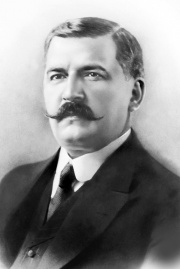1 Life↑
Venceslau Brás (1868-1966) was born into a traditional oligarchic family in the state of Minas Gerais. Brás later became a member of the Republican Party of Minas Gerais. He held the positions of mayor, state and federal congressman, and governor in Minas Gerais. Between 1910 and 1914, he occupied the vice presidency, going on to become president of Brazil from 1914 to 1918. Brás died in Itajubá, Minas Gerais on 15 May 1966.
2 Brás and the Brazilian Declaration of War↑
During the first decade of the 20th century, the United States had replaced England as Brazil’s main commercial and diplomatic ally. Brazilian economic and geopolitical interests, derived from its relationship with the United States, led Brás to become a defender of freedom and democracy in the Western world, values identified with that northern power. Therefore, he advocated Brazil’s alliance with the United States and the Triple Entente.
Brás ended Brazilian neutrality after the United States declared war on Germany. He demanded retaliation against Germany for the German attacks on Brazilian commercial vessels that began in April 1917. Under Brás, several German merchant ships anchored in Brazilian ports were seized. On 26 October 1917, his administration declared war on Germany. After the Inter-Allied Conference in Paris at the end of the year, Brás offered naval aid to the Allies in the Atlantic Ocean, including airmen and doctors.
Rafael Pinheiro de Araujo, Centro Universitário La Salle do Rio de Janeiro
Section Editor: Frederik Schulze
Selected Bibliography
- Abreu, Marcelo de Paiva / Carneiro Netto, Dionísio Dias (eds.): A ordem do progresso. Cem anos de política econômica republicana, 1889-1989 (The order of progress. One hundred years of republican economic policy), Rio de Janeiro 1990: Editora Campus.
- Gama, Arthur Oscar Saldanha da: A marinha do Brasil na primeira guerra mundial (The Navy of Brazil in the First World War), Rio de Janeiro 1982: Capemi.
- Garcia, Eugênio Vargas: Diplomacia brasileira e política externa. Documentos históricos (1493-2008) (Brazilian diplomacy and foreign policy. Historical documents (1493-2008)), Rio de Janeiro 2008: Contraponto.
- MacMillan, Margaret: Paz em Paris 1919. A Conferência de Paris e seu mister de encerrar a Grande Guerra (Peace in Paris in 1919. The Paris Conference and mister to end the Great War), Rio de Janeiro 2004: Editora Nova Fronteira.
- Vinhosa, Francisco Luiz Teixeira: O Brasil e a Primeira Guerra Mundial. A diplomacia brasileira e as grandes potências (Brazil and the First World War. Brazilian diplomacy and the great power), Rio de Janeiro 1990: Instituto Histórico e Geográfico Brasileiro.








